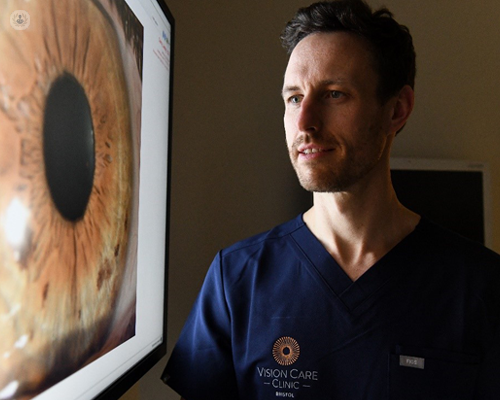How the latest keratoconus treatment can halt progression and correct vision
Written by:Keratoconus is an ophthalmological condition with a progressive nature, and patients who have it can experience issues with focus and vision quality. Furthermore, sight can be severely affected when it’s in its late stages.
Here to explain why it’s important to detect it as early as possible as well as detail the latest treatment available, is leading consultant eye surgeon and ophthalmologist in Bristol, Mr Kieren Darcy.

What is keratoconus?
Keratoconus is a progressive disease of the cornea, the clear domed front surface of the eye. It can cause thinning of the cornea, which gradually changes in shape, becoming conical rather than spherical. These changes cause short-sightedness (myopia) and irregularity in shape, which impacts on the focus and the quality of your vision.
In advanced stages of keratoconus, the cornea may develop a scar which further reduces the passage of light into the eye and subsequently affecting sight.
What is the main cause of keratoconus?
The cause of keratoconus is not really known; however, genetics and environmental factors are thought to be contributors. It’s more common in individuals who have:
Some ethnic groups have a higher incident rate.
How serious is keratoconus?
Keratoconus can have serious effects on a person’s vision and in a small percentage of patients, they require a corneal transplant if it’s severe.
Keratoconus usually develops in teenagers and young adults so it’s ideal to seek assistance as early as possible to halt the progress of the disease.
Can keratoconus be cured permanently?
For over 93 per cent of keratoconus patients, corneal cross linking can halt the progression of the disease by strengthening their corneal fibres.
There are also simple things that can be done to help, like stopping eye rubbing; this is vitally important, even after collagen crosslinking.
How is keratoconus treated?
Keratoconus cannot be treated with eye drops or medication and some patients simply manage with contact lenses. However, there are two additional arms of keratoconus management available. Either stopping it from getting worse or halting progression and improving vision.
A treatment called collagen crosslinking is used to halt the progression of keratoconus. This uses a combination of drops called riboflavin with vitamin B2 and ultraviolet (UV-A) light. These interact, resulting in the fibres within the cornea to bond more tightly and increase the corneal strength.
Overall, collagen crosslinking is successful in preventing further progression of keratoconus in more than 93 per cent of patients. Without CXL treatment, at least 20 per cent of all patients with keratoconus will eventually require a corneal transplant.
Are there any new treatments for keratoconus?
A more recent development in treatment for keratoconus is the option to not just halt the progression of the disease but also correct the visual irregularities caused by the keratoconus.
Thanks to advancements in corneal mapping and excimer laser treatment profiling, many patients can now have their corneas reshaped, usually prior to the cross-linking procedure. This improves the vision and then the cornea is strengthened. For around 80 to 95 per cent of people, this combination treatment is successful.
If you require expert treatment for keratoconus or other ophthalmological conditions, arrange an appointment with Mr Darcy via his Top Doctors profile.


